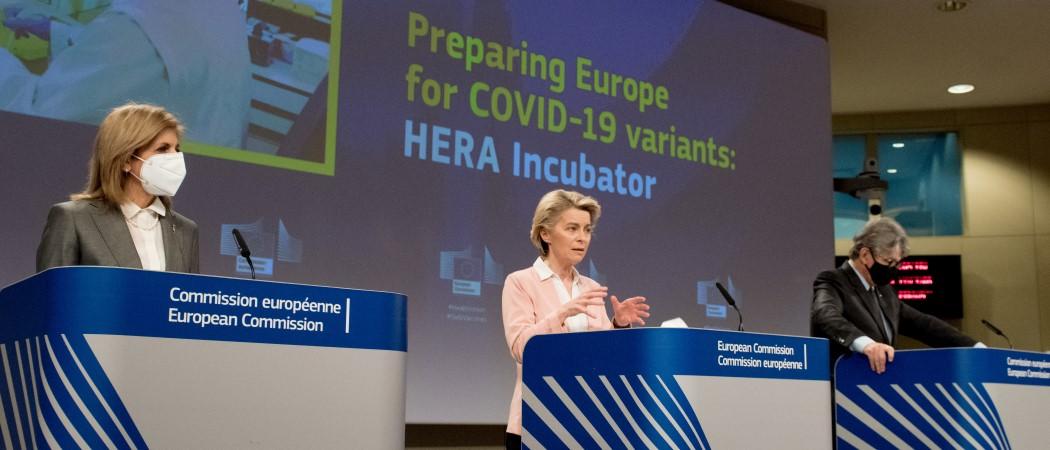Money will fund sequencing to pick up dangerous variants and trials network to test updated vaccines. Vaccines approvals will be eased and supply contracts modified. The initiatives are a dry run for the proposed Health Emergency Preparedness and Response Authority

From left to right, Stella Kyriakides, European Commissioner for Health and Food Safety, Ursula von der Leyen, President of the European Commission, , and Thierry Breton, European Commissioner for Internal Market, give a press conference on “HERA Incubator”. Photo: EU Commission.
The European Commission on Wednesday announced a drive to support pan-EU action to detect new variants of the SARS-CoV-2 virus, saying it will invest €225 million to increase genome sequencing to 5% of all cases, for research into transmissibility variants, to support fast exchange of sequencing and related epidemiological data and to develop new variant-specific diagnostics.
In addition, the Commission mooted modifying advance purchase agreements with vaccines manufacturers, to ensure vaccines will be updated to protect against evolving variants. At the same time the European Medicines Agency will speed up approvals of vaccines that are adapted to be active against variants of concern.
While it was presented largely as a proactive move to stay on top of variants, the Commission is trying to plug the gaps in its COVID-19 vaccines strategy and address criticisms of the slow vaccines rollout. At the heart of this delay is the omission that having sealed advance purchase agreements for 2.6 billion doses on behalf of all member states, the Commission failed to provide support for clinical trials and manufacturing scale-up.
For further cover, the measures were also presented as a dry run for the proposed Health Emergency Preparedness and Response Authority (HERA), modelled on the U.S. Biomedical Advanced Research and Development Authority. The legislative proposal for HERA is expected by the end of 2021.
In the meantime, Commission president Ursula von der Leyen said the initiatives announced this week will act as a ‘HERA incubator’, a new public-private cooperation between industry, scientists and regulators.
Experts working under the new structure, which brings together health authorities and labs, will work on speedily anticipating and coordinating industry and regulatory needs for updated vaccines to combat more dangerous variants.
Following weeks of criticism of the sluggish vaccine rollout, von der Leyen said, “We will focus on improving information sharing – this is of utmost importance – and planning and detection of new variants."
The new initiative will dedicate €75 million to sequencing emerging variants of the virus, encouraging member states to increase their sequencing capacity from an average of 1% across the bloc currently, to 5%. EU sequencing work has been highly uneven across the 27 states.
UK scientists have carried out far more sequencing work and have contributed 50% of all the viral genomes sequenced globally. It is this level of surveillance that means the UK has detected a number of variants of concern. These variants are undoubtedly in other European countries, and elsewhere, but the limited amount of sequencing means they are not being picked up.
Part of the money announced on Wednesday will go into the development of laboratory PCR tests specific to variants of concern, improving their detection.
There will be related funding to set up a virtual network of clinical trials sites among EU countries, Israel and Switzerland, allowing adapted vaccines to be tested at scale.
After the very unedifying public row with AstraZeneca over supplies of its vaccine, the Commission said it will now be a “prerequisite” for manufacturers to provide “a detailed and credible plan, showing capability to produce vaccines in the EU and deliver on a reliable timescale.”
A new helpdesk called the Task Force for Industrial Scale Up will handle queries from vaccine manufacturers.
Some variants, such as B 1.1.7, first detected in Kent, England, are more transmissible and cause more serious illness. Existing evidence indicates this variant does not affect the efficacy of vaccines, but other variants first detected in South Africa and Brazil have been shown even reduce the efficacy.
While the vaccines authorised for use in Europe and the US remain effective, updated versions may be needed before the end of the year. The Commission says it will speed-up regulatory approval, by applying the system used to approve annual updates of flu vaccines.
As the virus mutates, “our defences must evolve with them," said EU health commissioner Stella Kyriakides.





 A unique international forum for public research organisations and companies to connect their external engagement with strategic interests around their R&D system.
A unique international forum for public research organisations and companies to connect their external engagement with strategic interests around their R&D system.